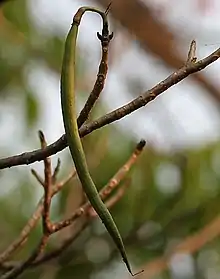Tabebuia heterophylla
Tabebuia heterophylla is a species of tree native to the Caribbean, including the Swan Islands of Honduras, and is also cultivated. It is also known as pink manjack, pink trumpet tree, white cedar, and whitewood.[3]
| Tabebuia heterophylla | |
|---|---|
 | |
| Scientific classification | |
| Kingdom: | Plantae |
| Clade: | Tracheophytes |
| Clade: | Angiosperms |
| Clade: | Eudicots |
| Clade: | Asterids |
| Order: | Lamiales |
| Family: | Bignoniaceae |
| Genus: | Tabebuia |
| Species: | T. heterophylla |
| Binomial name | |
| Tabebuia heterophylla | |
| Synonyms[2] | |
| |
Description

Tabebuia heterophylla grows up to 20 to 30 feet tall. It is palmate and compound and has green leaves that are evergreen throughout most of its range. In the spring and summer, one can see its pink or white flowers followed by seedpods that are long and slender. The fruit of the Tabebuia heterophylla grows to about 3 to 12 inches and is dry and brown. This characteristic of the fruit enables it to be showy, but does not attract wildlife.[4]
Wood
This tree is valuable for its timber production and grown for such purposes on plantations. It is commonly harvested from the wild for use locally and for export. [5]Pink manjack is used as a street tree. Its height allows for it to provide lasting shade and as a result it can provide shade for a residential property near the patio or deck. Its floral display allow it to be valued and as a result, it is known as an ornamental tree.
Flower anatomy

The flowers of Tabebuia heterophylla are in an inflorescence of the umbellate type. It is a perfect and complete flower with radial (actinomorphic) symmetry, and the whorls of the corrolla and the calyx are connately joined. The ovary is superior with an axile placentation, two locules and two carpels.
References
- Roberts, A. (2019). "Tabebuia heterophylla". IUCN Red List of Threatened Species. 2019: e.T157815878A157815887. Retrieved 11 August 2020.
- "The Plant List: A Working List of All Plant Species". Retrieved 17 September 2015.
- "Tabebuia heterophylla". Germplasm Resources Information Network (GRIN). Agricultural Research Service (ARS), United States Department of Agriculture (USDA). Retrieved 17 September 2015.
- Gilman, Edward F., et al. “Tabebuia Heterophylla: Pink Trumpet Tree.” EDIS New Publications RSS, Environmental Horticulture, 29 Mar. 2019, edis.ifas.ufl.edu/st616.
- Fern, Ken, and Ajna Fern. “Tabebuia Heterophylla.” No Record - Useful Tropical Plants, Useful Tropical Plants Database, 2014, tropical.theferns.info/viewtropical.php?id=Tabebuia heterophylla.
